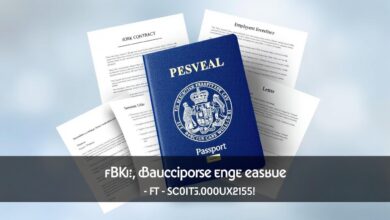Your Roadmap to a Sponsored Job in Italy: Application Tips and Legal Insights
Getting a sponsored job in Italy can be tough, especially for Nigerians. The Italy Sponsored Job Roadmap helps light the way.
Anúncios
It shows the special steps you need to take, unlike regular job hunting.
This guide gives you key application tips and legal advice. It helps you make smart choices when looking for a job in Italy. Knowing about sponsored jobs in Italy can help you find good career paths for foreign workers.
Understanding the Italian Job Market
The Italian job market is full of different opportunities, especially for international professionals. It’s important to understand this market to find the right career in Italy. Many sectors in Italy are growing fast, creating new job trends.
You will be redirected to another website
Overview of High-Demand Sectors
Several sectors in the Italian job market are in high demand. They need skilled professionals. Here are some of them:
- Information Technology: With more digital changes, companies need IT experts. They look for people in software development, cybersecurity, and data analysis.
- Healthcare: Italy’s aging population means more jobs for healthcare workers. This includes nurses, doctors, and medical technicians.
- Engineering: Italy’s strong manufacturing base means a need for engineers. This includes mechanical, civil, and electrical engineers.
- Tourism: Italy is a top tourist spot. This creates many jobs in hospitality, travel, and management services.
Key Industries for Foreign Workers
Foreign workers looking for jobs in Italy will find many industries hiring. The table below shows key sectors and the expected job openings soon.
| Industry | Projected Job Openings (2023-2025) | Typical Roles |
|---|---|---|
| Information Technology | 65,000 | Software Developer, Data Analyst |
| Healthcare | 45,000 | Nurse, Medical Technician |
| Engineering | 30,000 | Civil Engineer, Mechanical Engineer |
| Tourism | 50,000 | Hotel Manager, Tour Operator |
The Italian job market is lively, with many sectors open to foreign talents. Knowing these trends helps job seekers make better choices for working in Italy.
Eligibility Requirements for Sponsored Jobs
For non-EU citizens wanting to work in Italy, knowing the eligibility rules is key. Getting a sponsorship visa Italy and a work permit Italy means meeting certain criteria. This ensures a smooth start in the Italian job market. We’ll look at the different work visa types and what you need to work in Italy.
Work Visa Types for Non-EU Citizens
Non-EU citizens can apply for various work visas, depending on their job and situation. Here are the main visa categories:
- Work Visa: This is for those with a job offer from an Italian employer, needing a sponsorship visa Italy.
- Intra-Company Transfer Visa: For employees moving to an Italian branch of a multinational company.
- Seasonal Work Visa: For temporary jobs, like in agriculture or tourism.
General Criteria for Employment Eligibility
To get sponsored jobs, you must meet some basic criteria. These include:
- Educational Qualifications: Most jobs need a relevant degree or vocational training.
- Language Proficiency: Knowing Italian is often required, depending on the job and work environment.
- Work Experience: Having previous work experience in a similar field can help your chances.
How to Find Sponsored Job Opportunities
Looking for a job in Italy? Sponsored job opportunities are key. Online resources and networking can help a lot. By using different platforms and networking, you can find great jobs and meet employers.
Online Job Portals to Explore
Many online job sites help job seekers in Italy. Sites like LinkedIn and Indeed have lots of sponsored jobs. Also, Glassdoor, Monster, and InfoJobs offer jobs for foreigners. Knowing how to use these sites can make your job search easier.
- LinkedIn: Great for making a professional profile and finding recruiters.
- Indeed: Has a wide range of job listings in various fields.
- Glassdoor: Gives info on company culture and salaries.
- InfoJobs: Specializes in jobs in different industries in Italy.
Networking Strategies for Job Seekers
Networking is still very important in Italy. Joining expat groups and going to job fairs can help you understand the job market. Being part of professional groups can also lead to job tips and recommendations. Meetup for work events can grow your network and help you find jobs.
- Join Expatriate Groups: Meet people who have found jobs in Italy.
- Attend Job Fairs: Talk to employers and learn about job openings.
- Leverage Professional Connections: Use your current network for job leads.
- Utilize Social Media: LinkedIn is great for professional networking.
Preparing Your Application Materials
To get a sponsored job in Italy, you need to prepare well. This guide helps you make a great resume, write a strong cover letter, and show off your skills. These steps can help you stand out in Italy’s job market.
Crafting an Effective Resume
Making a good resume is key to showing your skills clearly. A good resume should have:
- Contact Information: Put your name, phone, email, and LinkedIn.
- Professional Summary: Write a short summary of your career goals and achievements.
- Work Experience: List your jobs, what you did, and what you achieved. Focus on what’s relevant to the job you want.
- Education: Talk about your degrees, where you got them, and when you graduated.
- Skills: Mention skills that match the job you’re applying for, especially the ones the employer wants.
Writing a Compelling Cover Letter
A cover letter is your chance to show why you want the job. Here are some tips:
- Personalization: If you can, address the letter to a specific person.
- Introduction: Start with something that grabs the reader’s attention.
- Connection: Show how your experiences fit the job, proving you’re excited and a good fit.
- Closing: End by saying you’re ready to talk more about the job.
Highlighting Relevant Skills and Experience
Showing off the right skills and experience can really help. Remember to:
- Tailor Content: Make sure your resume and cover letter match the job’s needs.
- Use Metrics: Use numbers to show how good you are at things.
- Showcase Soft Skills: Talk about your people skills and how you communicate, which are important in Italy.
Navigating the Application Process
Understanding the application process for sponsored jobs in Italy can really help. Knowing the steps, from finding jobs to applying and interviewing, makes things easier. Also, knowing what mistakes to avoid can help you move forward without problems.
Steps in the Application Procedure
- Research potential job openings that match qualifications and interests.
- Customize the resume and cover letter for each application, highlighting relevant skills.
- Submit applications through online portals or company websites.
- Follow up with the employers two weeks after submission to express continued interest.
- Prepare for interviews by researching common questions and company background.
Common Application Pitfalls to Avoid
Candidates should watch out for common mistakes in job applications that could stop them. These include:
- Failing to tailor the resume and cover letter for specific positions.
- Missing important deadlines for application submission.
- Neglecting to proofread documents for grammatical and spelling errors.
- Not following up after submitting the application.
- Being unprepared or uninformed during interviews.
Legal Insights for Working in Italy
Knowing the legal side of working in Italy is key for anyone looking for a job there. It’s important to understand employment contracts and employee rights. This knowledge helps you deal with work issues and makes your job better.
Understanding Employment Contracts
Employment contracts in Italy differ based on the job and industry. You’ll find contracts for permanent, fixed-term, and freelance work. Each has its own rules for employers and employees.
Employers must give written contracts that follow Italian labor laws. It’s crucial for employees to check for details like salary, job duties, and how to end the contract. Knowing these contract details helps protect your job and ensures clear work relationships.
Employee Rights in Italy
Knowing your rights at work in Italy is important for your safety. You have rights like a minimum wage, limited working hours, and paid vacation. There are also laws for health and safety and what happens if you lose your job.
These rights help you feel secure at work. They make sure you’re treated fairly. Knowing your rights helps you stand up for yourself and follow your contract.
| Type of Employment Contract | Key Characteristics | Typical Duration |
|---|---|---|
| Permanente | Indefinite term, job security | Indefinite |
| Determinato | Fixed duration, specific end date | Up to 36 months |
| Freelance | Independent, self-employed | Varies per contract |
Tips for Interviewing Successfully
Getting ready for an interview in Italy means focusing on a few key areas. Knowing how to answer common interview questions is crucial. It helps you feel confident and makes a strong impression on employers.
When applying for sponsored jobs, you’ll often face the same questions. Here are some common interview questions:
- Can you tell us about yourself?
- Why are you interested in this position?
- What are your greatest strengths and weaknesses?
- Describe a challenging situation at work and how you handled it.
- Where do you see yourself in five years?
It’s important to prepare answers that show off your skills and experiences. Make sure they match the job’s needs. Practicing your answers out loud can help you feel more comfortable.
Dressing right is also key in Italy. Knowing what professional attire for interviews means can show you’re serious about the job. Italian culture values a polished and formal look. Here’s what to wear:
- Men should wear a tailored suit, a dress shirt, and a tie.
- Women should choose a conservative dress or a skirt suit. Clothes should fit well and not be too revealing.
- Keep accessories simple and choose neutral colors to focus on professionalism.
- Don’t forget about grooming; neat hair and polished shoes are important.
By following these tips and preparing for common questions, you can stand out in a tough job market. Wearing the right clothes can also help you make a good impression and land the job you want.
Relocating to Italy: What You Need to Know
Relocating to Italy is a big step towards a new chapter in life. Finding the right housing is a key part of this journey. It makes settling into a new place easier. Also, understanding Italian culture can make your experience even better.
Exploring Housing Options in Italy
In Italy, you can find many housing options to fit your lifestyle and budget. Many people rent apartments in cities like Rome or Milan. These places offer great amenities and culture.
Shared living spaces are also popular, especially among young people and students. They help you save money and meet others. When renting, you’ll need to show proof of income and ID.
Knowing the local rental market can help you get a good deal. It’s also important to understand the rules about housing in different areas.
Adapting to Italian Culture
Adapting to Italian culture means being open-minded and diving into local customs. Things like greetings and table manners are different from what you might be used to. Getting involved in local traditions, like food and festivals, helps you connect with the community.
Italians love to socialize and build relationships. Making friends and connections is important. Joining local events and clubs is a great way to meet people and feel at home.
Post-Arrival Steps for New Employees
When you arrive in Italy for work, it’s important to follow the right steps. You need to handle local registration and manage your money well. These tasks help you settle in legally and comfortably.
Registering with Local Authorities
Registering with local authorities is a must. It gets you a residence permit and lets you use public services. You should go to the “Comune” to register. You’ll need your passport, proof of work, and address details.
Knowing how to register in Italy avoids legal problems later.
Opening a Bank Account in Italy
Setting up a bank account is also crucial. It helps with everyday money matters. Look for banks that cater to expats early on.
You’ll need ID, proof of where you live, and work details to open an account. A bank account makes paying bills and getting your salary easier.
FAQ
What is the process for obtaining a work visa in Italy?
To get a work visa in Italy, you need a job offer from an Italian employer. They must show they couldn’t find a local for the job. Then, you apply for a work permit, which takes a few weeks.
Which industries have the most job opportunities for foreigners in Italy?
Jobs are plentiful in IT, Engineering, Healthcare, and Tourism. These fields often look for foreign talent because of skill gaps.
How does the application process for sponsored jobs differ from regular jobs?
Sponsored jobs need more paperwork, like your qualifications and contract. You also need your employer’s promise to sponsor your visa, unlike regular jobs.
What are the eligibility requirements for obtaining a sponsorship visa in Italy?
You need a job offer, the right education, and language skills. Work experience is also important.
Where can I find sponsored job opportunities in Italy?
Look on LinkedIn, Indeed, and websites for foreign workers. Join expat groups and go to job fairs to find jobs.
What documents do I need to prepare for my job application?
Get a resume and cover letter that fit the Italian job market. Show your skills and experience. You might need qualifications and references too.
What should I expect during a job interview in Italy?
Expect questions about your experience and why you want the job. Dress professionally. It shows you’re serious about the position.
What are the rights of employees working in Italy?
Workers have rights to fair hours, vacation, and treatment. Know your contract well. It explains your and your employer’s duties and how to leave the job.
What practical steps should new employees take upon arriving in Italy?
Register with local authorities for your work permit and residency. Open a bank account. You’ll need ID and proof of employment for this.
Published on: 11 de April de 2025

Arturo González
Arturo González is the founder and lead writer of DebxCred.com, a platform created to help people make smarter and more informed financial decisions. With a degree in Business Administration and a specialization in Financial Marketing, Arturo built a solid corporate background before deciding to share his knowledge in a practical, easy-to-understand way.
Driven by a genuine passion for finance and education, Arturo turned DebxCred.com into a trusted source for detailed reviews of financial products, digital banking tools, and practical financial education — empowering readers to take control of their money with confidence.
In his free time, Arturo finds balance and inspiration while surfing — a hobby that reflects his calm yet determined approach to helping others build a healthier and more prosperous financial life.






